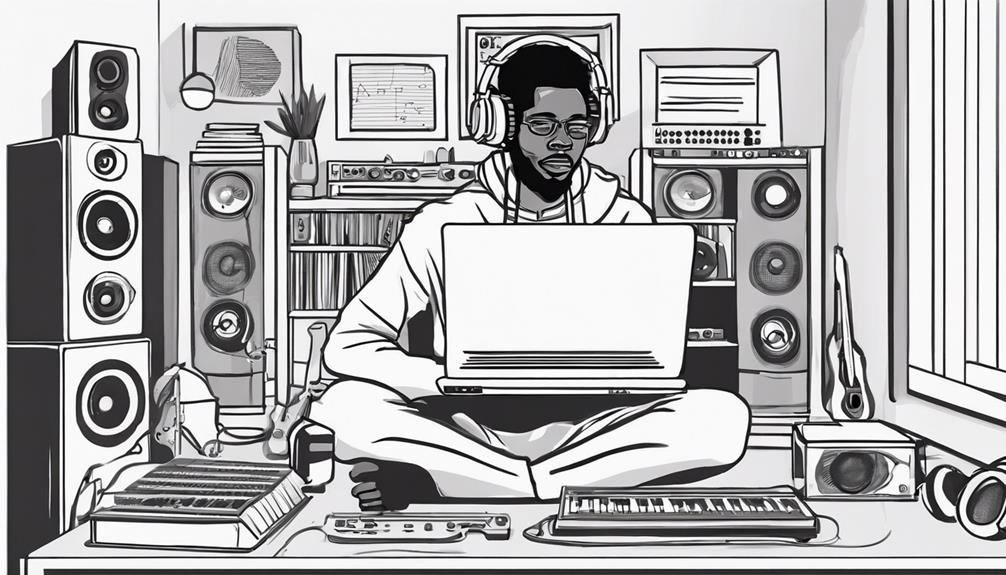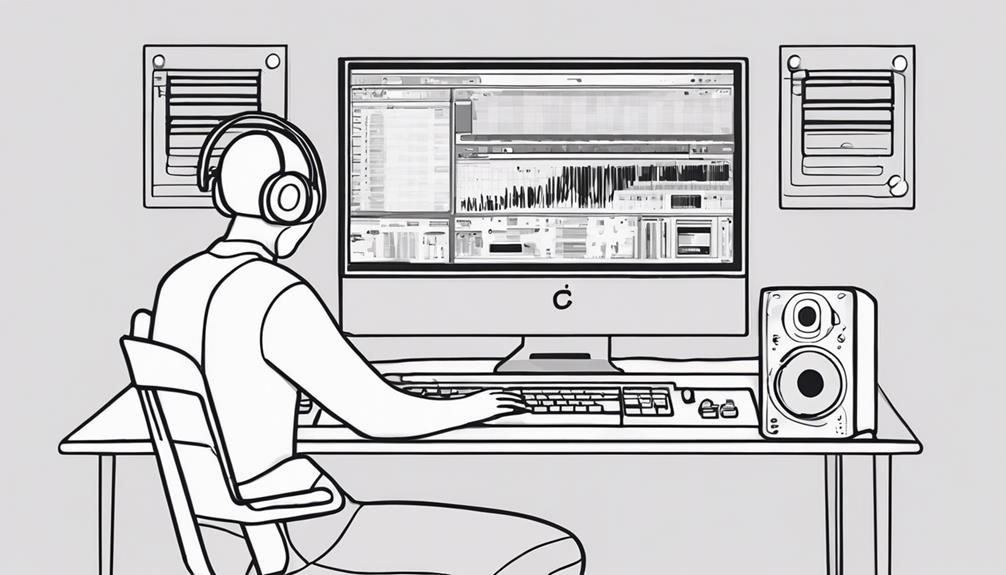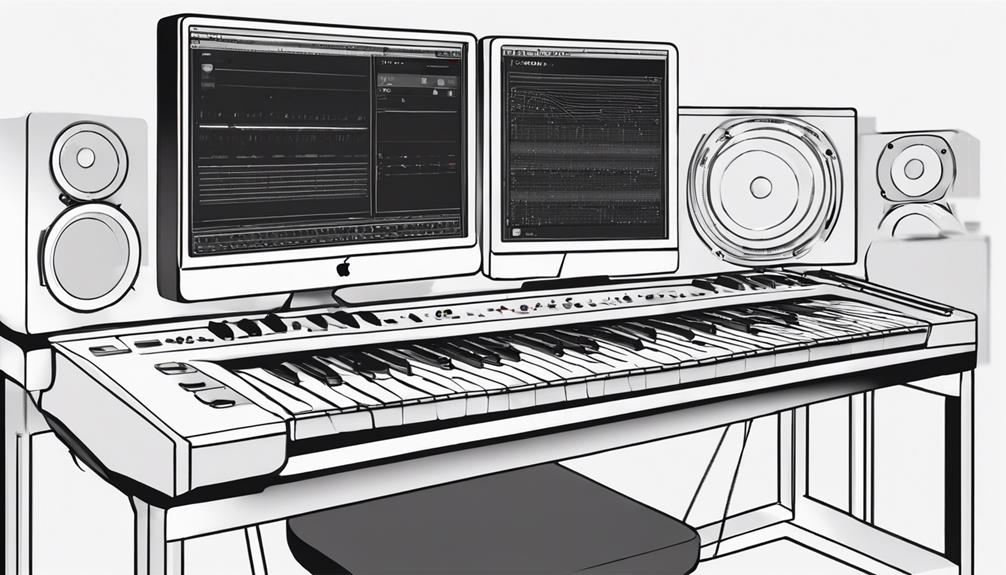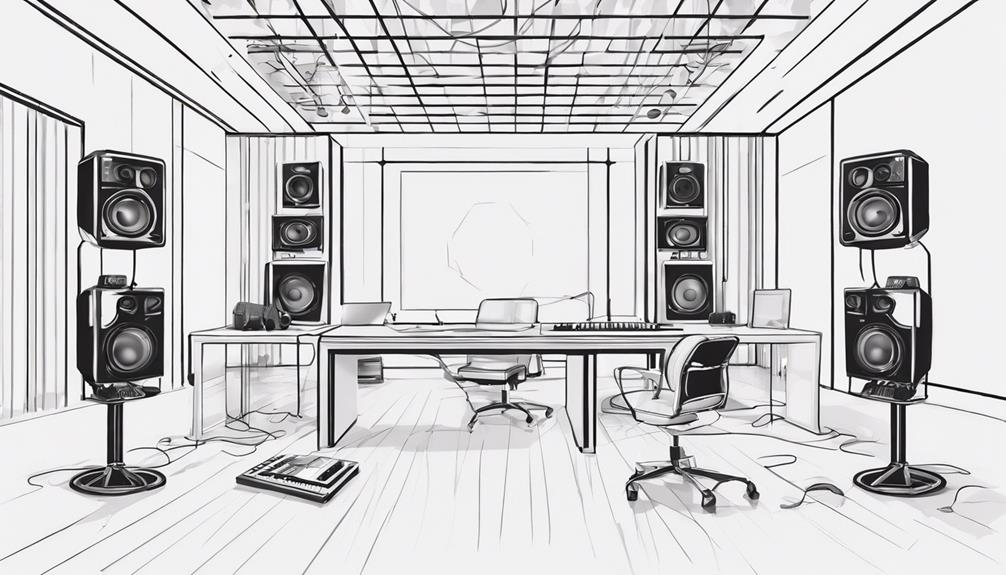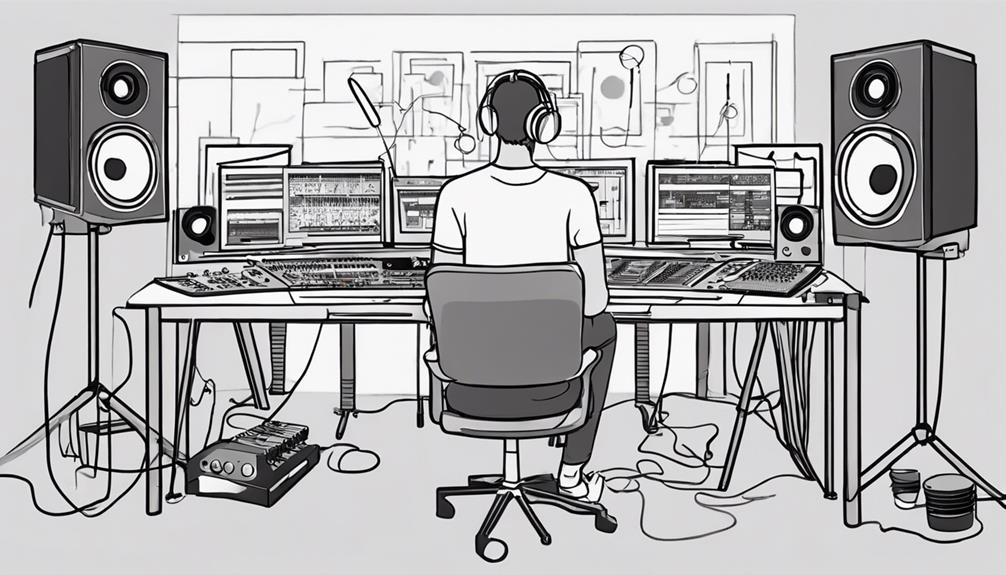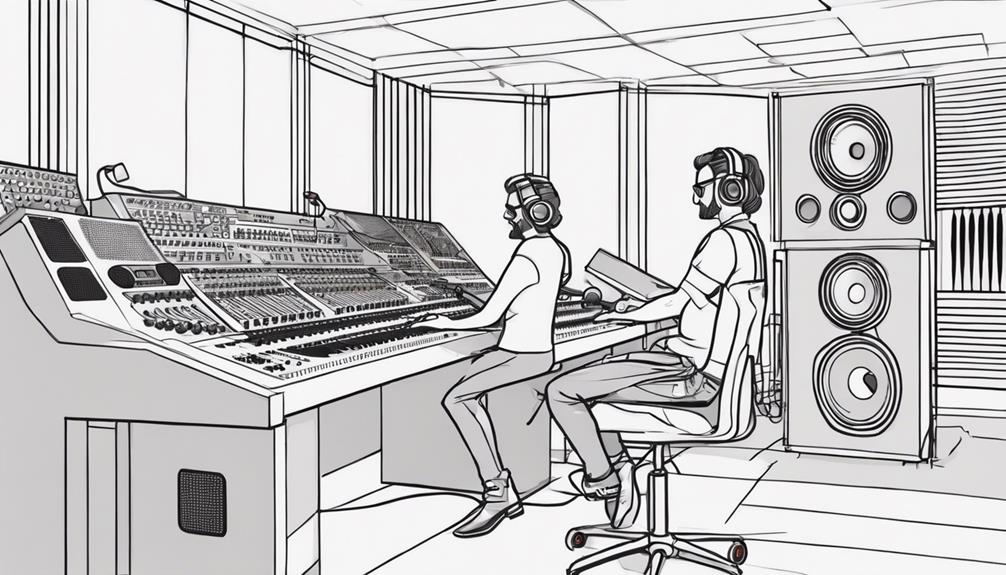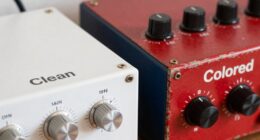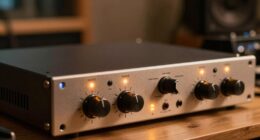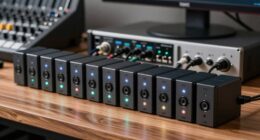Get started in music production in Nigeria by setting up a home studio in a quiet room with good acoustics. Invest in studio monitors, quality microphones, and MIDI controllers. Choose software like Fruity Loops for recording. Acoustic treatment can enhance sound quality. Consider USB microphones if you're on a budget. Research mentorship opportunities to connect with professionals. Integrate Nigerian musical influences into your sound for a unique style. This is just the start; there's much more advice waiting for you!
Key Takeaways
- Incorporate traditional Nigerian instruments for authenticity.
- Collaborate with local vocalists for genuine vocals.
- Learn Afrobeat rhythms and highlife melodies.
- Seek mentorship from established producers in Nigeria.
- Experiment with indigenous languages like Yoruba or Igbo.
Setting Up Your Home Studio
When starting on your music production journey in Nigeria, make sure to select a quiet room with favorable acoustics to set up your home studio.
One important piece of equipment to invest in for your studio is a pair of studio monitors. These specialized speakers are essential for accurately hearing the nuances of your music production. Studio monitors provide a flat frequency response, allowing you to mix and master your tracks with precision.
Make certain that your studio monitors are positioned correctly in your workspace. Place them at ear level and equidistant from your mixing position to create an ideal listening environment.
Additionally, consider acoustic treatment such as foam panels or bass traps to improve sound quality in your room. By setting up your studio monitors in a well-treated space, you can guarantee that your music productions are of the highest quality.
Choosing the Right Equipment
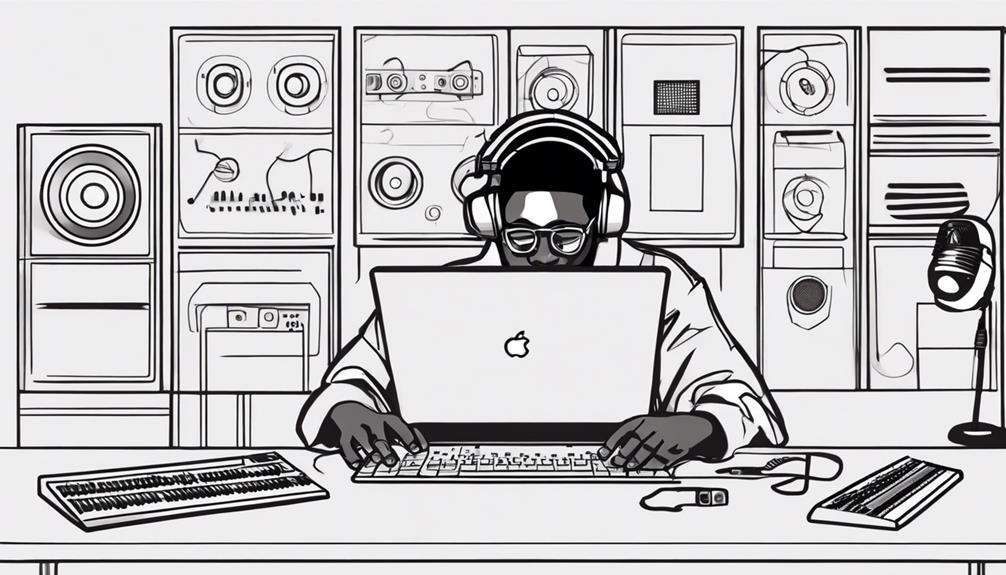
When selecting equipment for your music production journey, it's crucial to contemplate tips for making the right choices and finding gear that fits your budget.
Opt for quality studio microphones to guarantee clear vocal recordings, and think about incorporating MIDI controllers like keyboards to enhance your musical creativity.
Look into software options like Fruity Loops or Cubase for vital recording and editing tools that can elevate your production process.
Equipment Selection Tips
To guarantee exceptional music production quality, carefully selecting the right equipment is essential for your setup in Nigeria.
When choosing an audio interface, make sure it has the necessary inputs and outputs to connect all your gear efficiently.
Invest in a computer with sufficient processing power and RAM to handle the demands of music production software like Ableton Live or Pro Tools.
A MIDI controller with drum pads and faders can provide tactile control over your music, enhancing your workflow.
For recording vocals, opt for a studio microphone known for its ability to capture clear and crisp vocals, elevating the quality of your recordings.
When deciding between a USB microphone for affordability or an XLR microphone for professional sound quality, consider your budget and sound requirements.
Budget-Friendly Gear Options
Explore budget-friendly gear options to assemble a cost-effective music production setup without compromising quality.
Begin by opting for USB microphones, which offer a cost-effective solution for recording vocals and instruments. These microphones provide decent sound quality for beginners in music production.
Look into affordable MIDI controllers that can help trigger sounds and improve your music production workflow without breaking the bank.
Entry-level studio monitors are another essential component to explore, as they offer accurate sound representation for your mixes at a reasonable price point.
When it comes to software, explore free options like Audacity or GarageBand to kickstart your music production journey without a hefty investment.
Additionally, make the most of online resources and tutorials available to guide you through setting up your budget-friendly music production setup effectively.
Selecting the Best Software
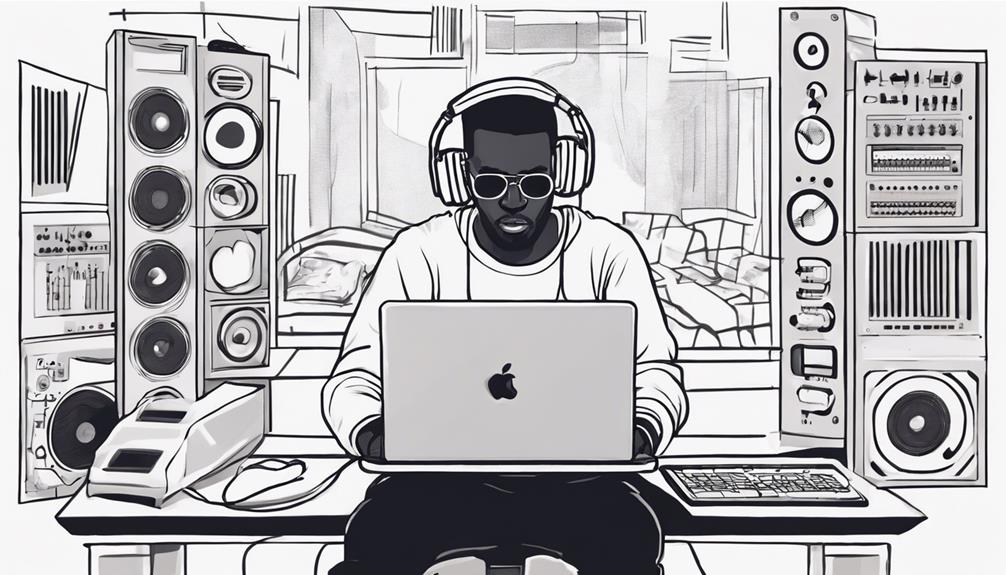
Explore popular software options like FL Studio, Ableton Live, or Logic Pro X when selecting the best music production software for your needs in Nigeria.
To choose the most suitable software, consider the following:
- Look for software with a user-friendly interface that aligns with your workflow as a music producer.
- Verify that the software offers a wide range of virtual instruments and effects to enhance your creativity and production quality.
- Assess the compatibility of the software with your computer system and operating system to avoid technical issues.
- Check for regular updates and reliable customer support to ensure a smooth music production experience without interruptions.
Before making a final decision, it's advisable to explore trial versions or demos of the software to test its features and functionalities.
Understanding MIDI Controllers
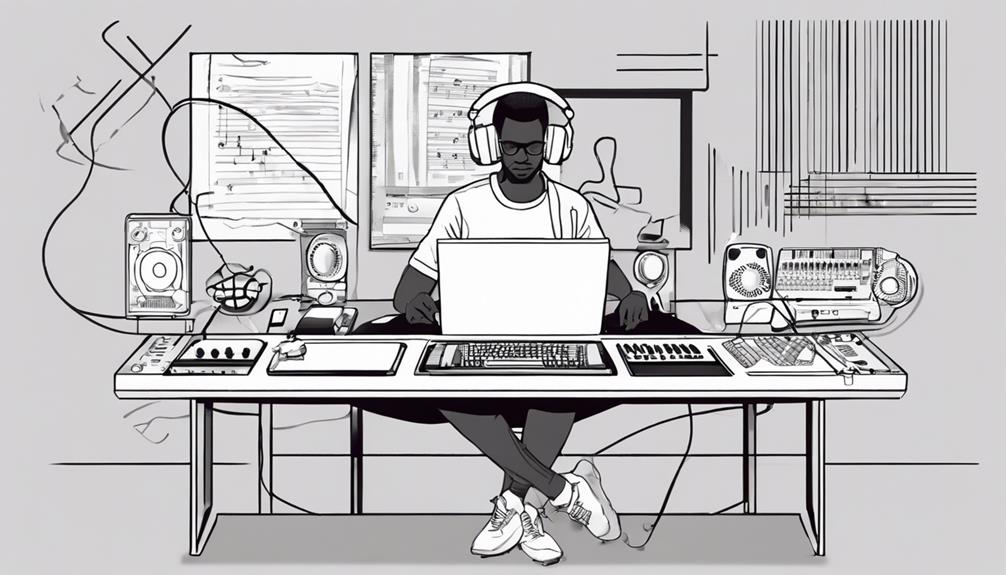
When starting music production, understanding MIDI controllers is essential. These devices serve as your gateway to controlling virtual instruments and software, offering features like keys, pads, knobs, sliders, and buttons.
Make sure to grasp the basics, choose the right controller for your needs, and seamlessly integrate it with your music production software for a smooth workflow.
MIDI Controller Basics
To comprehend MIDI controllers, it's crucial to grasp their role in music production and how they facilitate hands-on control over virtual instruments and software parameters. MIDI controllers, such as keyboards, drum pads, and control surfaces, allow for tactile manipulation of music production software, enhancing creativity and workflow.
Here are some basics to explore:
- Hardware and Software: MIDI controllers can be either hardware devices like keyboards or software applications that generate and transmit MIDI data.
- Versatility: MIDI controllers come in various types, sizes, and configurations to cater to different preferences and production needs.
- Connectivity: They can be easily connected to computers or music production hardware using USB or MIDI cables for seamless integration.
- Enhanced Control: MIDI controllers provide a hands-on approach to music production, allowing for real-time adjustments and expressive capabilities.
Understanding these fundamental aspects of MIDI controllers will set a solid foundation for your music production journey in Nigeria.
Choosing the Right
Selecting the appropriate MIDI controller is essential for optimizing your music production setup and workflow in Nigeria. MIDI controllers play an important role in the music industry by allowing you to trigger sounds, control software instruments, and manipulate music software in real-time.
When choosing a MIDI controller, consider the type that best suits your production style. Keyboard-style controllers are ideal for playing melodies and chords, while pad controllers are great for drum programming and triggering samples. Knob controllers offer tactile control over parameters like filters and effects, enhancing your ability to sculpt sounds.
Additionally, make sure that the MIDI controller you select is compatible with your music software and connects seamlessly to your computer through USB or MIDI cables. Understanding the features and functionality of MIDI controllers will greatly benefit your music production process, enabling you to express your creativity efficiently and effectively in the Nigerian music industry.
Integration With Software
Understanding how MIDI controllers integrate with software is crucial for maximizing your music production capabilities. MIDI controllers serve as the bridge between your physical inputs and the virtual world of music production, enabling you to interact with software instruments and effects in a tactile manner.
Here are some key points to keep in mind when delving into the world of MIDI controllers:
- Compatibility: Make sure that your chosen MIDI controller is compatible with your preferred DAW, such as Pro Tools, to seamlessly integrate hardware and software components.
- Functionality: Explore the different features and capabilities of MIDI controllers to find one that aligns with your workflow and production style.
- Mapping: Learn how to map MIDI controllers to specific parameters within your software to customize control and enhance efficiency.
- Expression: Utilize the expressive capabilities of MIDI controllers, such as velocity sensitivity and aftertouch, to add nuance and dynamics to your music productions.
Investing in Quality Microphones
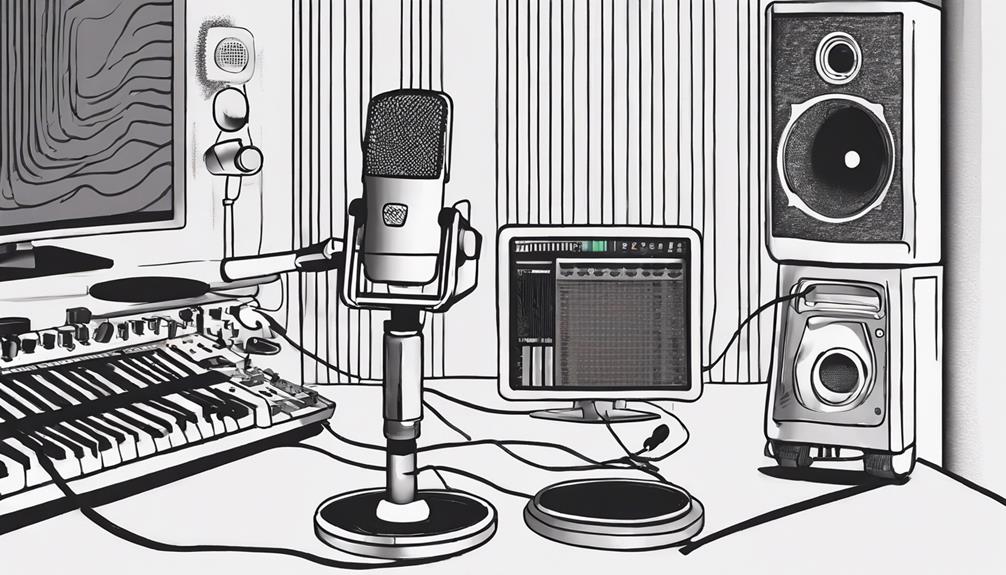
When embarking on your music production journey in Nigeria, prioritize investing in quality microphones to guarantee clear vocal and instrument recordings. Quality microphones, such as condenser or dynamic types, play an essential role in capturing the nuances of vocals and instruments, enhancing the overall quality of your productions. Consider factors like frequency response, polar pattern, and durability when selecting a microphone to make sure it meets your recording needs. Brands like Shure, AKG, and Rode are well-known for offering reliable microphone options suitable for various recording scenarios.
To help you make an informed decision, here is a comparison table showcasing different types of microphones, including USB mics, to guide you in selecting the best microphone for your music production setup:
| Microphone Type | Advantages | Disadvantages |
|---|---|---|
| USB mic | Plug-and-play convenience | Limited professional audio quality |
| Condenser mic | High sensitivity and detailed sound | Requires phantom power |
| Dynamic mic | Durability and good for loud sound sources | Less sensitive for softer sounds |
| Ribbon mic | Warm sound and smooth frequency response | Fragile and requires careful handling |
Investing in a good microphone can greatly elevate the sound quality of your recordings, so choose wisely.
Connecting With Audio Interfaces
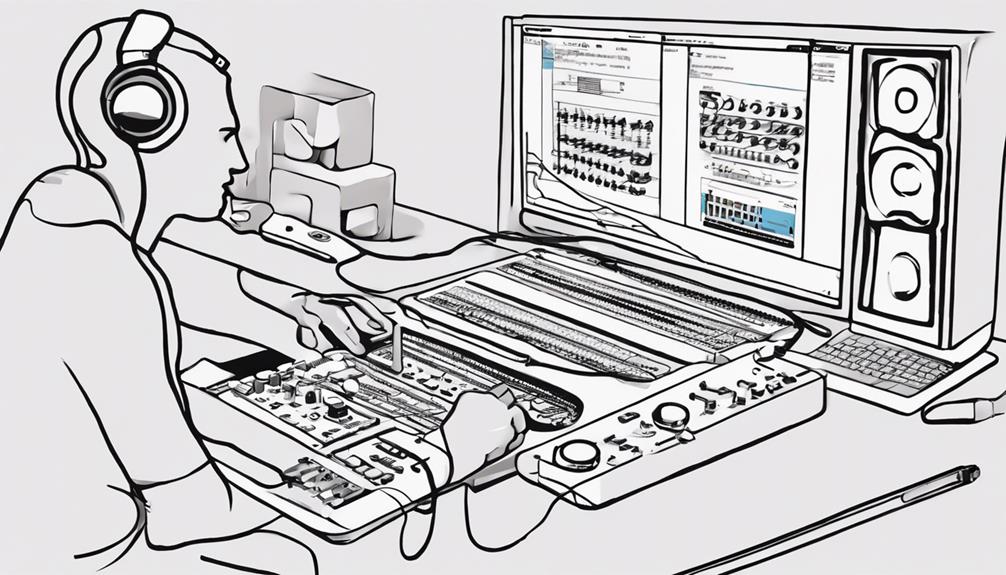
For a seamless integration of your instruments and microphones with your computer for recording, contemplate incorporating audio interfaces into your music production setup. Audio interfaces act as the intermediary between your analog instruments and microphones, and your digital recording software. Here are some essential points to keep in mind when connecting with audio interfaces:
- High-Quality Conversion: Audio interfaces provide excellent analog-to-digital conversion, ensuring professional sound recording quality.
- Multiple Inputs/Outputs: They offer various inputs and outputs, allowing you to connect multiple devices simultaneously for a versatile recording setup.
- Built-In Preamps: Many audio interfaces come equipped with integrated preamps that amplify microphone signals, enhancing the overall sound quality of your recordings.
- Compatibility and Budget: Choosing the right audio interface depends on your recording needs, budget constraints, and compatibility with your existing setup. Make sure to select an audio interface that meets your requirements without overspending.
When setting up your studio, remember that you need a sound card to effectively connect and record your music.
Seeking Mentorship Opportunities

Consider joining music production forums or communities to connect with experienced professionals for mentorship opportunities. These platforms can be invaluable for networking and finding mentors who can provide guidance and support as you navigate the music production industry.
Additionally, interning with established music producers in Nigeria is a great way to gain practical skills and insights into the field. By actively participating in music production workshops or seminars, you can further expand your network and increase your chances of finding mentors who can help shape your career.
Furthermore, don't underestimate the value of seeking out local music studios or production houses where you can shadow and learn from seasoned professionals. Immersing yourself in these environments can offer hands-on experience and mentorship opportunities that can accelerate your growth as a music producer.
Developing Your Unique Sound
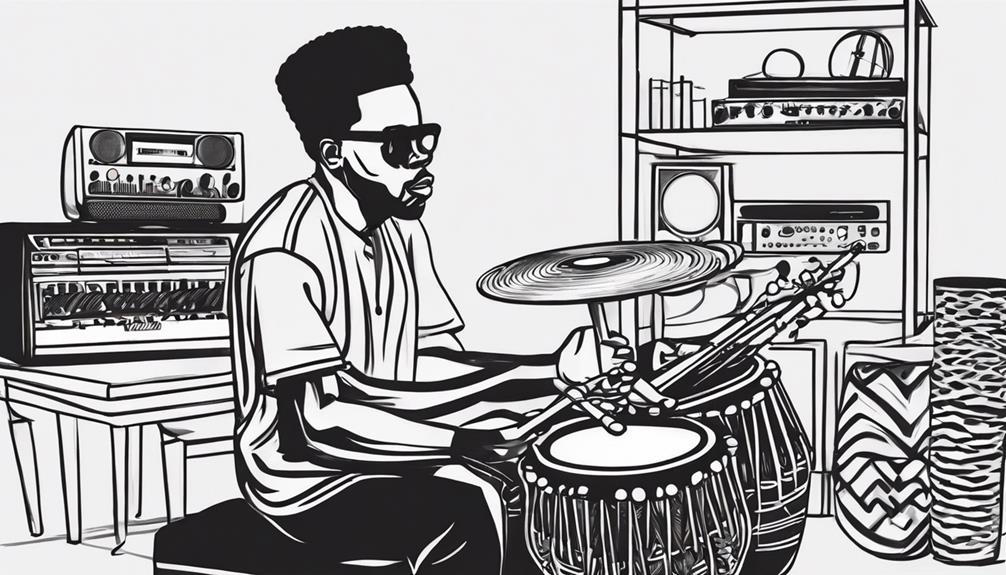
To cultivate a unique sound in your music production, explore incorporating traditional Nigerian instruments and cultural influences into your tracks. Experiment with traditional Nigerian instruments like talking drums or shekere to infuse local sounds into your music.
You can also incorporate Afrobeat rhythms, highlife guitar melodies, or Naija hip-hop influences for a distinct Nigerian flavor in your productions.
Collaborating with local vocalists or rappers can add authentic Nigerian vocals and lyrical content to your tracks, enhancing the cultural richness of your music.
Additionally, utilizing indigenous languages like Yoruba, Igbo, or Hausa in your music can provide a unique and culturally significant touch to your sound.
Drawing inspiration from Nigerian music legends like Fela Kuti, King Sunny Ade, or Tiwa Savage can help you develop your own signature style.
Frequently Asked Questions
What Is Needed to Start Music Production?
To start music production, you need a computer with music software, a MIDI controller for sounds, and a good microphone for vocals. Connect to an audio interface for pro sound. Start small and grow your setup over time.
How Much Does It Cost to Learn Music Production in Nigeria?
Learning music production in Nigeria can cost between ₦50,000 to ₦500,000, varying based on the program or private lessons. Consider online courses for affordability, ranging from ₦10,000 to ₦100,000. Scholarships and payment plans may also be available.
How Much Are Music Producers Paid in Nigeria?
Music producers in Nigeria can earn a wide range of salaries, from ₦100,000 to ₦1,000,000 or more per project. Your income can also come from royalties and production credits on successful songs. Negotiate payment structures that suit your involvement level.
Is Music Production Lucrative in Nigeria?
Music production in Nigeria is indeed lucrative. You can earn substantial income by producing hit songs for popular artists, working on sound production for Nollywood, and collaborating with emerging talents. Leveraging digital platforms enhances profitability. Additionally, hosting workshops and offering online courses on beat-making and sound engineering can also open up new revenue streams. To truly make money from music production, it’s essential to stay updated with global trends, invest in quality equipment, and consistently build a strong network within the entertainment industry. By diversifying services and tapping into international markets, Nigerian music producers can further amplify their earnings and recognition. Moreover, promoting branded merchandise or offering licensing opportunities for beats and soundtracks can serve as additional income streams. Building a personal brand through social media and collaborating with influencers can help attract more clients and projects. By combining creativity with strategic business approaches, it’s clear that there are endless opportunities to make money from music production in Nigeria and beyond.
Conclusion
Now that you've got your home studio set up and the right equipment in place, it's time to start creating music that truly reflects your unique sound.
Remember, mentorship and guidance can go a long way in shaping your music production journey. So don't be afraid to reach out for help and continue to experiment with different techniques to bring your music to life.
The possibilities are endless, and your talent is waiting to shine like a bright, pulsating star in the Nigerian music industry.

